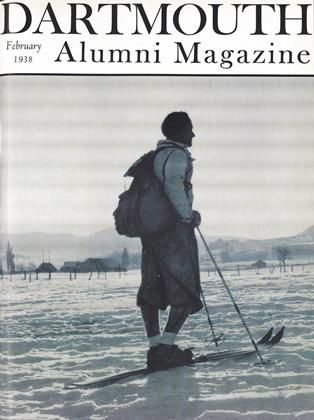RICHARD P. WHITE 'lB, PLANT PATHOLOGIST, CREDITSMUCH TO INSPIRATION OF HIS DARTMOUTH COURSE
FOR A STUDENT struggling, perhaps a bit blindly, with the broad curriculum of a liberal college, it is perhaps difficult to see just how Moliere and Racine, Schopenhauer, Tolstoy, or William James are going to prove of service in later life, say in the very practical task of preserving beautiful elm trees from modern ravages, or saving roses from bacterial disease. And yet in an effort to produce
some concrete testimony to the value of a
liberal education, the ALUMNI MAGAZINE has asked some of the graduates of the College to supply it with some data which, it is hoped, will prove to be evidence.
In such a task as this, the preservation of useful trees and plants, threatened by an onrushing civilization, Richard P. White of the class of 1918 is engaged, his center of operation being the Agricultural Experiment Station of the State of New Jersey at New Brunswick. The MAGAZINE is interested in Mr. White's success, but it is really more concerned in the method by which he reached his office in this field, and what value a liberal college curriculum had upon his career.
To get some idea first of the scope and importance of this work, it is necessary to trace Mr. White's progress after leaving Dartmouth. He went first to Cornell, where in 1918 he was at once shifted into war work, serving with the New York Conservation Commission. Later, probably influenced by the spirit of the times, and by a friend, he began the study of medicine at Dartmouth, but left that position to serve in the 28th Artillery, C.A.C. The war finished, he returned to Cornell with scholarships both from Cornell and Dartmouth to continue his study of plant pathology. After three years of study, he did commercial work with the Niagara Canning Cos. at Wilson, N. Y., for a while, but later accepted an appointment as Assistant State Plant Pathologist at the Kansas Agricultural College and Experiment Station.
In 1927 he began his most important work in the New Jersey Agricultural Experiment Station. In Kansas he had been working on the study of the nature and control of potato and tomato diseases. At the new post he left behind him the old field and went pioneering into the land of plant pathology, a study of diseases, affecting ornamental plants, including all florist crops, shrubs, potted plants, nursery material, annuals, perennials, and shade trees. The program in New Jersey was constantly enlarged until in scope and terri- Tory it covered the entire state, and a wide range of research and application. The results of this work have been literally enormous. He helped build up the National Shade Tree Conference from 15 members to many times that number, with 425 delegates attending the recent convention in Boston. As the result of his researches he has published more than 300 articles in various journals and trade publications. He publishes himself, and has for eight years, "Nursery Disease Notes," which has a circulation all over the country and abroad. He has edited the National ShadeTree Conference, and in the last year originated and published a little journal called Arborist's News. In addition he is in his third year as assistant editor of Phytopathology.
In other words, he has become an authority in his own field, consulted by growers of ornamental plants from all parts of the United States.
Now what relation has all this to Dartmouth or to the Liberal College? It is this, that the men he met and worked with at Dartmouth with its broad curriculum, had, as he testifies a very great influence. Would the same result have been obtained at a more specialized training school? Well, the question is open. Here however is fact. He says that courses in logic, foreign languages, psychology, and others "which a scientist often frowns upon in his early career, have been invaluable to me personally in whatever success I have had." He places also great stress upon the influence of the men he studied under. The original inspiration came from Professor George R. Lyman, but the main work at Dartmouth was done under Professor A. H. Chivers '02, "to whom," he says, "I owe an unpayable debt of gratitude." Professor Chivers gave him an important bit of detail to perform in the preparation of a research problem, and as he says, "sent me off to Cornell for graduate work."
PROMINENT IN A LITTLE-KNOWN BUT IMPORTANT LIFE-WORK Original work on plant diseases has been done by Mr. White ('18) at the AgriculturalExperiment Station of the State of New Jersey. He has become an authority of thefirst rank in his field.
 View Full Issue
View Full Issue
More From This Issue
-
 Article
ArticleThe D. O. C. Started Something
February 1938 By CHARLES E. WIDMAYER '30 -
 Article
ArticleGradus Ad Parnassum
February 1938 By The Editor -
 Class Notes
Class NotesClass of 1914
February 1938 By Edward Leech -
 Class Notes
Class NotesClass of 1937
February 1938 By Donald C. Mckiniay -
 Class Notes
Class NotesClass of 1910
February 1938 By Hap Hinman -
 Class Notes
Class NotesClass of 1930
February 1938 By Albert Dickerson
ERIC P. KELLY '06
-
 Article
ArticleVOX CLAMANTIS IN DESERTO
December 1924 By Eric P. Kelly '06 -
 Article
ArticleWAS THE PROFESSOR RIGHT?
June 1935 By Eric P. Kelly '06 -
 Article
ArticleSquash Little '91 "Constant Champion"
October 1936 By ERIC P. KELLY '06 -
 Books
BooksTHE NEW YORK TRIBUNE SINCE THE CIVIL WAR
February 1937 By Eric P. Kelly '06 -
 Article
ArticleExacting Requirements in Science
January 1940 By ERIC P. KELLY '06 -
 Books
BooksJOURNALISM AND THE STUDENT PUBLICATION
June 1952 By Eric P. Kelly '06







